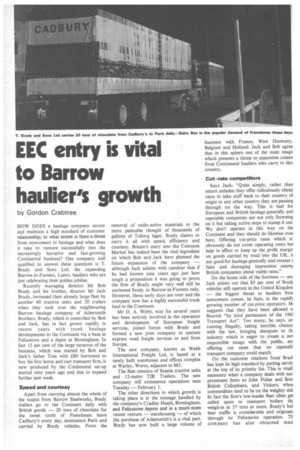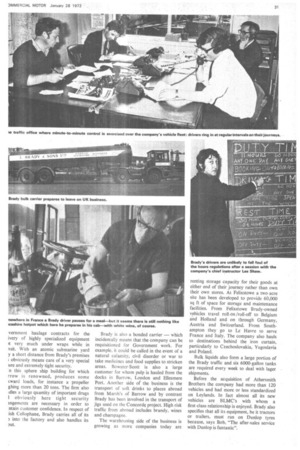EEC entry is vital to Barrow hauliers growth
Page 32

Page 33

If you've noticed an error in this article please click here to report it so we can fix it.
by Gordon Crabtree HOW DOES a haulage company secure and maintain a high standard of customer relationship; to what extent is there a threat from newcomers in haulage and what does it take to venture successfully into the increasingly lucrative and fast-growing Continental business? One company well qualified to answer these questions is T. Brady and Sons Ltd, the expanding Barrow-in-Furness, Lanes, hauliers who are just celebrating their golden jubilee.
Recently managing director Mr Bob Brady and his brother, director Mr Jack Brady, increased their already large fleet by another 40 tractive units and 50 trailers when they took over the neighbouring Barrow haulage company of Athersmith Brothers. Brady, which is controlled by Bob and Jack, has in fact grown rapidly in recent years with trunk haulage developments to the Continent via a base at Felixstowe and a depot at Birmingham. In fact 15 per cent of the large turnover of the business, which was started by Bob and Jack's father Tom with £80 borrowed to buy his first horse and cart transport firm, is now produced by the Continental set-up started nine years ago and due to expand further next week.
Speed and courtesy Apart from carrying almost the whole of the output from Barrow Steelworks, Brady trailers go to the Continent daily with British goods — 20 tons of chocolate for the sweet tooth of Frenchmen leave Cadbury's every day, destination Paris and carried by Brady vehicles. From the removal of radio-active materials to the more palatable thought of thousands of gallons of Tuborg lager, Brady claims to carry it all with speed, efficiency and courtesy. Britain's entry into the Common Market has indeed been the vital ingredient on which Bob and Jack have planned the future expansion of the company — although Jack admits with candour that if he had known nine years ago just how tough a proposition it was going to prove the firm of Brady might very well still be anchored firmly in Barrow-in-Furness only. However, those early days are over and the company now has a highly successful trunk haul to the Continent.
Mr D. A. Webb, WI10 for several years has been actively involved in the operation and development of European freight services, joined forces with Brady and formed a new joint company to operate express road freight services to and from Europe.
The new company, known as Webb International Freight Ltd, is based at a newly built warehouse and offices complex at Warley, Worcs, adjacent to M5.
The fleet consists of Scania tractive units and 12-metre TIR Trailers. The new company will commence operations next Tuesday — February 1.
The other directions in which growth is taking place is in the tonnage handled by the company's Cradley Heath, Birmingham, and Felixstowe depots and in a much more recent venture — warehousing — of which the purchase of Athersmith's is a vital part. Brady has now built a large volume of
business with France, West Germany, -Belgium and Holland. Jack and Bob agree that in this sphere one of the main snags which presents a threat to expansion comes from Continental hauliers who carry to this country.
Cut -rate competitors
Says Jack: "Quite simply, rather than return unladen they offer ridiculously cheap rates to take stuff back to their country of origin or any other country they are passing through on the way. This is bad for European and British haulage generally and reputable companies are not only frowning on it but taking active steps to stamp it out. We don't operate in this way on the Continent and they should do likewise ovet here. Offering cut-price rates which sc obviously do not cover operating costs bui help in effect to keep up the profit margir on goods carried by road into the UK, not good for haulage generally and creates e false and damaging impression amonE British companies about viable rates."
On the home side of the business — am Jack points out that 85 per cent of Brad3 vehicles still operate in the United Kingdoh — the biggest threat to hauliers fron newcomers comes, he feels, in the rapid13 growing number of cut-price operators. HI suggests that they have been allowed tc flourish "by kind permission of the 1961 Transport Act". Too many, he says, an running illegally, taking horrible chance with the law, bringing disrepute to th industry which is eager to create a nes responsible image with the public, am offering cut rates that no reputabl transport company could match.
On the customer relations front Brad: has kept its high standard by putting servic at the top of its priority list. This is vita' necessary when a company deals with sue prominent firms as John Fisher and Son: British Cellophane, and Vickers, whos commodities tend to be on the weighty sic14 In fact the firm's low-loader fleet often get called upon to transport boilers the weigh-in at 37 tons or more. Brady's bul beer traffic is considerable and originate through its Felixstowe operation. Tt company has also obtained man .vernment haulage contracts for the ivery of highly specialized equipment a very much under wraps while in nsit. With an atomic submarine yard y a short distance from Brady's premises ; obviously means care of a very special ure and extremely tight security.
'n this sphere ship building for which rrow is renowned, produces some (ward loads, for instance a propeller ghing more than 20 tons. The firm also idles a large quantity of important drugs i obviously here tight security ingements are necessary in order to ntain customer confidence. In respect of .ish Cellophane, Brady carries all of its 3 into the factory and also handles its put.
Brady is also a bonded carrier — which incidentally means that the company can be requisitioned for Government work. For example, it could be called in the event of a natural calamity, civil disorder or war to take medicincs and food supplies to stricken areas. Bowater-Scott is also a large customer for whom pulp is hauled from the docks in Barrow, London and Ellesmere Port. Another side of the business is the transport of soft drinks to places abroad from Marsh's of Barrow and by contrast Brady has been involved in the transport of jigs used on the Concorde project. High risk traffic from abroad includes brandy, wines and champagne.
The warehousing side of the business is growing as more companies today are renting storage capacity for their goods at either end of their journey rather than own their own stores. At Felixstowe a two-acre site has been developed to provide 60,000 sq ft of space for storage and maintenance facilities. From Felixstowe Brady-owned vehicles travel roll-on /roll-off to Belgium and Holland and on through Germany, Austria and Switzerland. From Southampton they go to Le Havre to serve France and Italy. The company also hauls to destinations behind the iron curtain, particularly to Czechoslovakia, Yugoslavia and Poland.
Bulk liquids also form a large portion of the Brady traffic and six 6000-gallon tanks are required every week to deal with lager shipments.
Before the acquisition of Athersmith Brothers the company had more than 120 vehicles and had more or less standardized on Leylands. In fact almost all its new vehicles are BLMC's with whom a first-class relationship is enjoyed. Brady also specifies that all its equipment, be it tractors or trailers, must run on Dunlop tyres because, says Bob, "The after-sales service with Dunlop is fantastic".
























































































